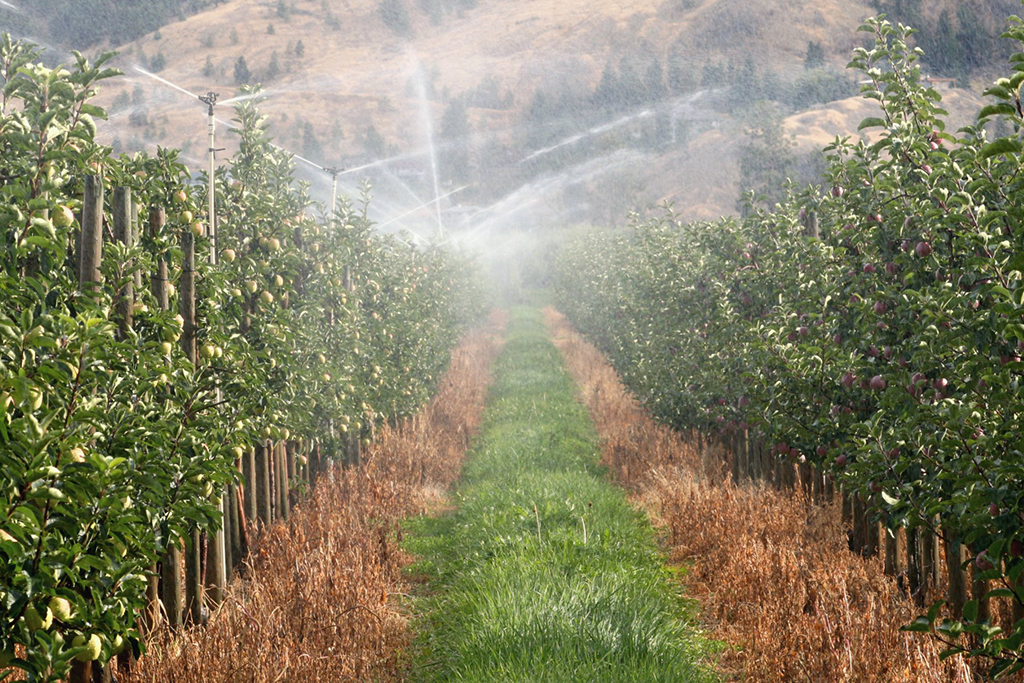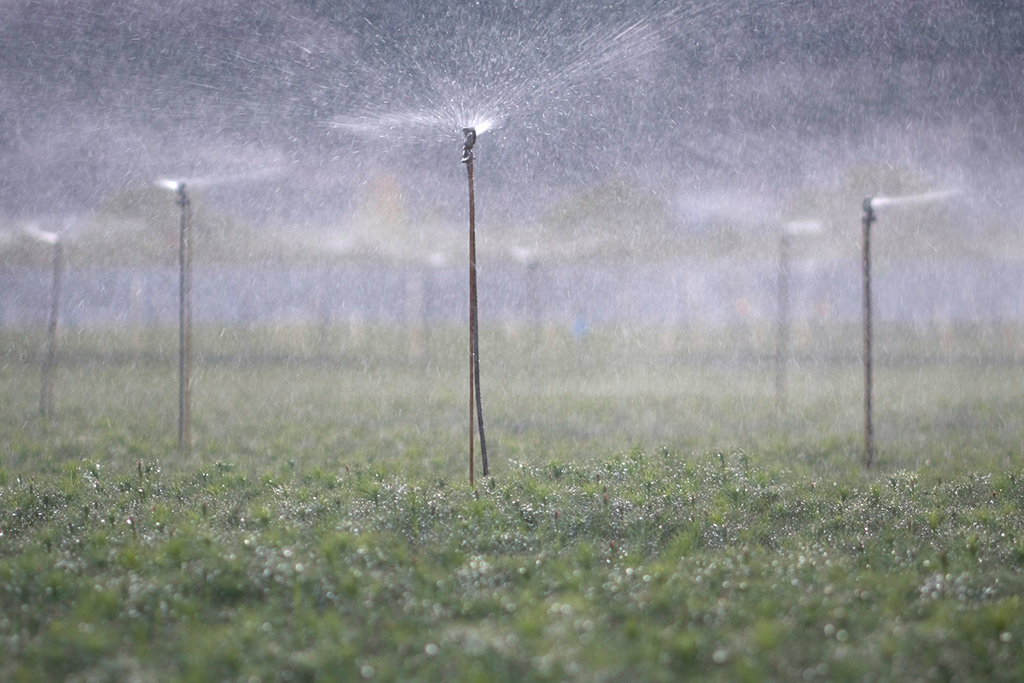There’s still time for the British Columbia government to save its troubled groundwater licensing system, observers and experts say, but it will require stronger commitment and action than the province has shown so far.
With a deadline fast approaching and licence applications coming in slowly, the government needs to act now to avoid having to choose between creating chaos for water users or backing down and losing credibility, they say.
Decades in the making, the licensing system is a step towards measuring how much water businesses are using and allowing the government to manage the shared resource. The collective use by agriculture, the oil and gas industry, bottled water companies and other major users can put pressure on the resource, depleting aquifers.
“Water could be a really feel-good story,” said Oliver Brandes, co-director of the POLIS Project on Ecological Governance at the University of Victoria. “These are problems that can actually be solved. Government has the jurisdiction; they have the support of communities.”
A main worry for Brandes and others who have been working on water issues for decades is the looming March 1 deadline for commercial groundwater users to apply for a licence.
As of the end of September, the Ministry of Forests, Lands, Natural Resource Operations and Rural Development had received only 4,177 applications, fewer than one-quarter of the number of users it estimates will need licences.
The requirement applies to existing and new users of groundwater — generally from wells or dugouts — for agriculture, industry or business. People using well water for household use are exempt from the requirement but are encouraged to register their wells to help government manage the resource.
“The consequences of a failed groundwater transition — political, economic, ecological — cannot be overstated and are extremely difficult to reverse,” Brandes and POLIS Project water policy specialist Rosie Simms warned last March in a letter to the provincial ministers responsible.
Failure would erode the public trust in the government’s ability to manage water resources and undermine the Water Sustainability Act, they said. It would also cause “severe impact to possible future investments and tens of thousands of businesses and farms that rely on water for their operations, particularly in rural areas.”
Existing users who miss the deadline would have no right to use groundwater until they get a licence, a process that can take years. Getting a licence at that point could require expensive studies to show there’s enough water available and there’s no guarantee the licence would be granted.
There are, however, many possible solutions to save the process, Brandes and Simms wrote.
They suggested increased communication with water users and giving ministry staff more clear direction to reach out to people to help them file applications. The government could also move to a two-step licensing process where existing users could submit a “placeholder application” requiring only basic information, they said.
Such an approach would allow people to protect their existing water rights, but would also get them started on the licensing process. More detailed information could be collected in an added second step.
The government should also prioritize regions of the province like the Okanagan, southeast Vancouver Island and the Lower Mainland that are the most water-stressed; provide a clear implementation plan with key milestones; allocate staff time and resources to the file; and conduct compliance checks so there are “clear signals about the consequences of non-compliance.”
Water management and the implementation of the act have also been raised by various presenters to the government’s select standing committee on finance and government services which is consulting on what should be in next year’s budget.
Ted van der Gulik, the president of the Partnership for Water Sustainability in B.C. and a respected former Agriculture Ministry official, proposed dedicating $30 million a year for the next decade to water management.
“Without a substantial influx of funding, the situation will become even more complex and volatile, as a new user — for example, a water bottling company — qualifies for a groundwater licence while a local rancher goes bankrupt because he no longer has legal access to water his cattle.”
Many groundwater aquifers in the province are already at risk, and improving water management is key to building B.C.’s resilience to the increasing impacts of climate change, he wrote.
Donna Forsyth, a legislative advisor for the Ministry of Environment when the Water Sustainability Act went through who has since retired, told the committee that water management should be the government’s top priority and needs its own independent ministry.
“It cannot remain buried in a ministry that fails to prioritize this key resource and instead has a mandate to support forestry and other land development even when it is in conflict with water conservation and aquatic habitat protection,” she wrote.
Another former government employee, Mike Wei, argued for putting significant resources into staffing to address unauthorized water use and investing in groundwater science and water use monitoring.
“Water has, for far too long, been treated as a neglected resource,” he wrote. “This, in turn, has limited the economic potential of this province. Prioritizing groundwater management... will significantly strengthen B.C.’s future and increase water users’ commitment to use the resource wisely to allow B.C. to achieve its water sustainability goals.”
Wei was involved in the act’s development as the program lead for groundwater and deputy comptroller of water rights. He retired from the government in 2018 and still works as a consultant.

Water relates closely to several of the government’s commitments, including reconciliation with Indigenous peoples, addressing climate change and protecting salmon, Brandes said in an interview.
And yet the government has failed to show it takes the issue seriously. “B.C. is well below average in how we manage, how we monitor, how we govern water.”
What’s needed is leadership and follow-through, he said.
In late September, when The Tyee asked Premier John Horgan about the groundwater licensing issue, he said it would be best to ask the minister responsible. “I’m not aware of the state of play on that file,” he said. “It’s not come on my desk in the past little while, so it’s not top of mind for me.”
The minister, Kootenay West MLA Katrine Conroy, was unavailable for an interview.
“Our government continues to take steps to engage with commercial groundwater users and remind them of the need to submit their application,” a ministry spokesperson said in an email.
Those who don’t apply by the March deadline will lose their “historical date of first use recognition,” the statement said. “That historical date is vital because during water shortages older licences get priority access to water.”
Those who don’t apply will no longer be permitted to use groundwater until they get a licence, it said.
A September press release gave a reminder that the deadline is less than six months away and that once it passes existing users without a license will need to stop using groundwater.
“There may be consequences for businesses if they miss the March 1, 2022, deadline to apply for an existing use groundwater licence,” it said.
Existing users are required to pay annual rentals retroactive to Feb. 29, 2016, the date the act came into force. Annual rental costs depend on the purpose for the water’s use and the quantity of water. There is an online rental estimator to determine how much water rent may be payable with fees varying depending on the use.
A farmer using 100,000 cubic metres each year to water crops would pay an annual rental fee of $85. Put another way, the rental for enough water to fill an Olympic-sized swimming pool would cost them $2.13.
Companies bottling drinking water, using non-deep groundwater for fracking, or using water for waste management pay $5.63 for each swimming pool worth of water they use. A pulp mill or placer mine is charged $3.25 per swimming pool.
So far, the government’s communications have failed to capture the urgency of the situation, according to opposition leaders who say the province has mismanaged the transition to the new licensing system.
“It’s certainly a significant issue for people who use groundwater in British Columbia,” said Shirley Bond, the interim leader of the BC Liberal Party.
“The risk exists that if they are not registered by the deadline, they potentially could lose access to groundwater,” she said. “We are deeply concerned about the consequences for people who fail to meet that registration deadline.”
Bond, MLA for Prince George-Valemount, said the problem is government mismanagement, not the fault of people who are required to register, and the ministers involved need to do better.
“We continue to see this pattern: let’s announce something, then the followup, the implementation, is chaotic,” she said. “They need to be doing a better job of reminding British Columbians how significant the need to register is.”
Sonia Furstenau, leader of the BC Green Party and the MLA for Cowichan Valley, also said the government has mismanaged the issue.
“Instead of this being an incredible opportunity for government to be getting out in front of a potential crisis, this is actually government creating an unnecessary crisis by not doing their job of getting people licensed under this act as the act requires. It’s astonishing.”
The government needs to treat the issue with more urgency and do more to let people know about the deadline, she said, adding that she’s spoken with young farmers in her community who had no idea they need to apply for a licence.
“Clearly this has not been a priority,” Furstenau said. “This is a food security issue. This isn’t some abstract concern for regulations. If farmers aren’t able to irrigate their crops and provide water to their animals, we are diminishing food security.”
Big industrial users of water likely know about the change in regulations and will have applied for licences, but farmers and small businesses may be caught unaware, she said. “They’re not perusing government legislation and press releases to find out how they stay in compliance with regulations.”
The government could be a lot more innovative about reaching people, she said, such as through farmers’ markets, chambers of commerce and local agriculture groups. “There are so many ways this government could be looking for solutions to this problem, but I don’t really see any real indication that’s happening.”
If it wanted to go a step further, the government could use the water rents it collects in each region to protect and restore local watersheds, she said. It could create local watershed boards, consistent with the Declaration on the Rights of Indigenous Peoples Act, to make decisions.
The need to better manage water use is only going to become greater, said the POLIS Project’s Brandes.
When he started working on water issues in 2003, the province was in a drought so severe it was believed to be a “once in a lifetime” event, he said. “Since then, I’ve seen three like that, probably worse,” he said.
“This year’s certainly worse. We’ve got to accept we’re in a different regime, and that means we have to manage water a whole lot tighter.”
During the summer drought, people tended to respond well when asked to take voluntary measures to reduce water use, but as problems linger it will be important to have strong and clear leadership, Brandes said.
“I suspect with things like drought, floods, wildfires, all these things have real impacts on water, we can only rely on voluntary measures so much,” he said. “We have to regulate groundwater, which means proper applications, proper enforcement and if people are outside those rules, there has to be consequences.” ![]()
Read more: Food, Environment
















Tyee Commenting Guidelines
Comments that violate guidelines risk being deleted, and violations may result in a temporary or permanent user ban. Maintain the spirit of good conversation to stay in the discussion.
*Please note The Tyee is not a forum for spreading misinformation about COVID-19, denying its existence or minimizing its risk to public health.
Do:
Do not: